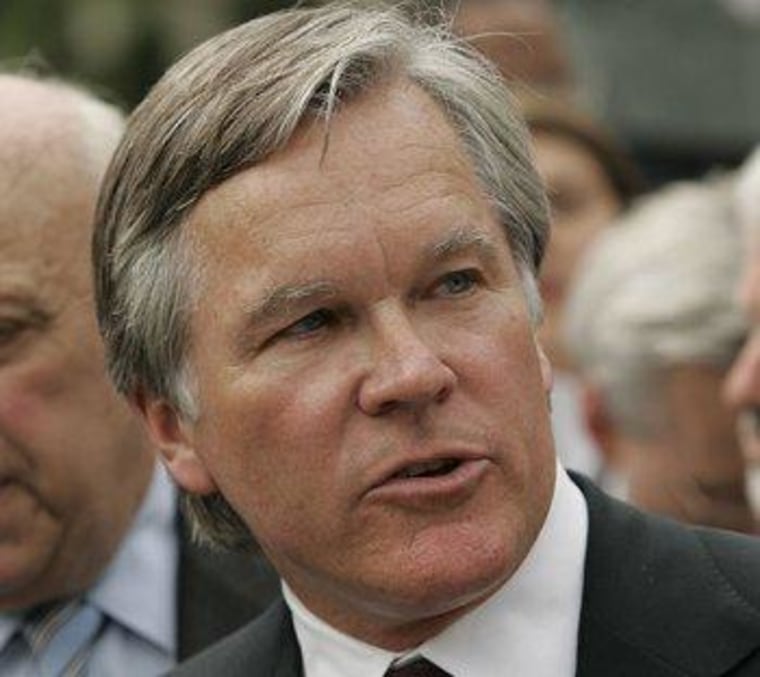There's been quite of a bit of commentary in recent weeks about who ultimately bears responsibility for Republicans' refusal to compromise in advance of the sequestration deadline, with a few too many pundits reflexively relying on the lazy "blame both sides" canard.
The New York Times' Bill Keller joins the crowd today -- his column's headline reads, "Obama's fault" -- and since his piece is longer and more fleshed out than most of the other related commentary, I read it thinking he might have something new to contribute to the general media dissatisfaction with President Obama.
So, what's Keller's pitch? It's worth noting at the outset that the Times columnist concedes that "much of the responsibility for our perpetual crisis can be laid at the feet of a pigheaded Republican Party." OK, but if that's the case, how do we get to "Obama's fault"?
When President Obama told us in his first Inaugural Address that our time of "putting off unpleasant decisions" was over, advocates of reforming our fiscal disorder read that as a promise that the new president would go beyond the perennial economic quick fix. After pulling the country back from the brink of depression by pumping some stimulus into the system (thumbs up for that), it seemed plausible that he would make some hard choices to put the promises of government more in balance with its resources.Instead, the president's first big initiative was to create an overdue but expensive new entitlement, the Affordable Care Act. I'm not one of those who fault him for putting health care at the front of the line. But Obama emerged from that battle looking like a president who had spent the last of his political capital. And the great fiscal issues remained unaddressed.
Well, that's not quite right. For one thing, expecting the president in 2009 to turn his attention to deficit reduction -- in the midst of a jobs crisis, as the nation was struggling to establish the foundations of an economic recovery -- is deeply misguided. The nation needed more investment, not less.
For another, Keller's argument is predicated on the assumption that the Affordable Care Act is an "expensive" endeavor that ignores "great fiscal issues." As a factual matter, this appears to have the reform law backwards -- "Obamacare" addresses the nation's fiscal future directly by reducing the deficit and helping control health care costs in the coming years. The law, in other words, is a critical component of the larger agenda that Keller hoped Obama would pursue -- making politically difficult choices that serves public needs in a way that helps bring the budget closer to balance. It would seem, then, that Keller should be praising the president's efforts on this front, not criticizing them.
Keller then shifts gears.
The Simpson-Bowles agenda was imperfect, and had plenty to offend ideologues of the left and right, which meant that it was the very manifestation of what Obama likes to call "a balanced approach." So did he seize it as an opportunity for serious debate about our fiscal mess? No, he abandoned it. Instead, he built a re-election campaign that was long on making the wealthiest pay more in taxes, short on spending discipline, and firmly hands-off on the problem of entitlements.If Obama had campaigned on some version of Simpson-Bowles rather than on poll-tested tax hikes alone, he could now claim a mandate from voters to do something big and bold. Most important, he would have some leverage with members of his own base who don't want to touch Medicare even to save it.
This isn't quite right, either. As Greg Sargent explained, far from "poll-tested tax hikes alone," the president during his re-election bid actually unveiled a multi-trillion-dollar debt-reduction plan, which included considerable spending cuts and "reforms" to entitlement programs like Medicare.
What's more, I'm not sure why Keller is convinced the president "abandoned" a debate about the nation's fiscal future. Obama presented a plan, in writing, that did the exact opposite, and spoke extensively on the subject throughout 2012, including his desire for compromise. More to the point, the president also repeatedly endorsed the goals and many of the provisions of the Simpson-Bowles agenda, which is far more than can be said of his rivals in the other party.
From there, Keller makes the point that he wishes Obama had negotiated differently when dealing with Republican tactics that included political extortion, hostage taking, and in Keller's words, "blackmail." I'm not unsympathetic to concerns about the president's negotiating postures, but I'm not altogether sure why the columnist is blaming the president for the GOP's reckless tactics -- the complaint reads a bit like someone critiquing whether a mugging victim was effective in handing over his wallet.
The bottom line remains the same: the president has played by the rules, accepting concessions, offering compromises, and negotiating in good faith. In the meantime, Republicans have been unyielding, condemning the very idea of compromise, threatening deliberate national harm, and walking away from overly generous offers that fall short of 100% of their demands.
So, remind me, how is it "Obama's fault"?
